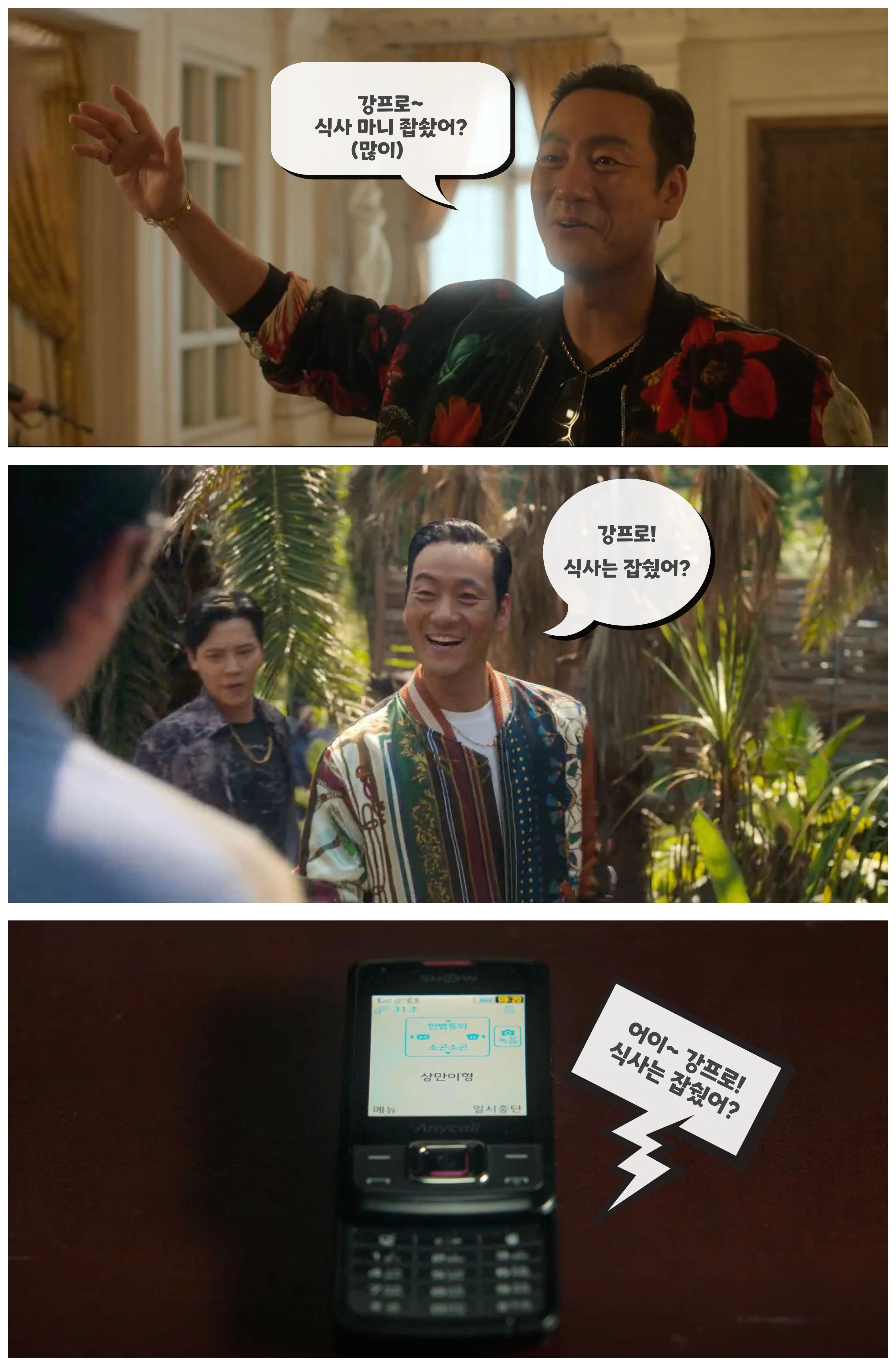Actor Park Hae-soo's greeting style in K-drama Suriname
🗣 강프로 식사 많이 잡쉈어? Hey Kang-pro, Did you eat full?
🇰🇷 넷플릭스 케이 드라마 수리남에서 배우 박해수가 하정우와 만나거나 혹은 전화 통화로 입버릇처럼 말하던 인사법 "강 프로 식사 많이 잡쉈어?"를 실제 한국인들도 많이 사용할까?
그리고 한국인의 퍼스트 네임인 김, 강, 박, 전, 이, 최 등 뒤에 프로를 붙여 부르는 이유가 무엇일까?
한국에서 '프로'는 특정한 분야에서 최고의 경지에 이른 사람을 의미한다. 일반적으로 프로 축구선수, 프로 농구선수, 프로 게이머, 프로 골퍼 등등. 프로 스포츠 리그에서 활동하는 사람들에게 프로라는 호칭이 부여된다.
하지만 스포츠뿐만 아니라 어느 한 분야에서 실력이 출중하거나 많은 사람들에게 그 실력을 인정받는 사람이 있다면 누군가가 그 사람에게 '프로' 타이틀을 부여하는 경우가 있다.
그런 의미에서 박해수가 극중 하정우를 부를 때 '프로'라고 말한 것은 그가 사업적인 분야에서 훌륭한 실력을 갖추었거나 단지 그의 위상을 높여주기 위해 쓴 호칭이라 해석할수 있다.
🇺🇸 In the Netflix K-drama Suriname, actor Park Hae-soo meets Ha Jung-woo with talks on the Phone like a habit of saying "Professional Kang, did you eat a lot?" Do Koreans actually use a lot?
And what is the reason for the Koreans' first name Kim, Kang, Park, Jeon, Lee, Choi, etc. followed by 'Pro'?
In Korea, a 'pro' refers to a person who has reached the highest level in a particular field. In general, professional soccer players, professional basketball players, professional gamers, professional golfers, etc. Those who play in professional sports leagues are given the title of pro.
However, if there is a person who excels in other fields as well as sports, or is recognized for his/her ability by many people, someone often adds the title of 'pro' to that person's first name.
So, the reason he said 'pro' when he called Ha Jung-woo was to increase his status by recognizing that Ha Jung-woo is a person with great skills in the business field.
🇰🇷 한국인의 대화에서 누군가가 상대방에게 "식사 잡쉈어?" 라고 묻는다면 사무적인(공적인) 관계를 맺고있는 사람들간에 오고가는 대화이며 질문을 하는 사람이 상대방보다 나이가 많은 사람임을 유추할수 있다.
잡수다 는 먹다 와 같은 의미 이지만 '잡수다' 가 '먹다' 보다 격식이 있는 단어이며 주로 나이가 적은 사람이 상대적으로 나이가 많은 사람에게 식사 여부를 물을때 "식사 잡수셨어요?" 혹은 "식사 잡쉈어요?" 라고 묻는다.
하지만 '잡쉈어요?' 에서 '요' 를 빼고 "잡쉈어?" 라고 물으면 상대를 존중하고 높이면서 나보다 나이가 어린 상대방을 하대하지 않는 어감과 늬앙스를 상대에게 전달할 수 있다.
한국에는 이러한 관계가 너무나 많다. 양자가 공적 이거나 사무적인 관계이지만 무조건 나이가 많은 사람이 나이가 적은 사람을 하대할수는 없기 때문에, 어떻게 보면 최대한의 절충안을 마련하고자 한 의지가 단에 안에 녹아져 있는 것이다.
🇺🇸 In Korean conversation, when someone asks the other person "sigsa jabswoss-eo?" is a conversation between people in a business relationship, also meaning that the person asking the question is older than the other person.
'jabsuda' has the same meaning as 'meogda', but 'jabsuda' is a more formal word than 'meogda'. Usually younger people ask a relatively older person, "sigsa jabsusyeoss-eoyo?" or "sigsa jabswoss-eoyo?" is often asked.
But excluding 'yo' and saying, "jabswoss-eo?" If you ask the other person, you can convey the tone and nuance of respecting and not ignoring the other person who is younger than you.
There are too many such relationships in Korea. Although the two have a business relationship, it is also an expression of their will to come up with the best possible compromise because an older person cannot unconditionally treat a younger person.



Comments
Post a Comment